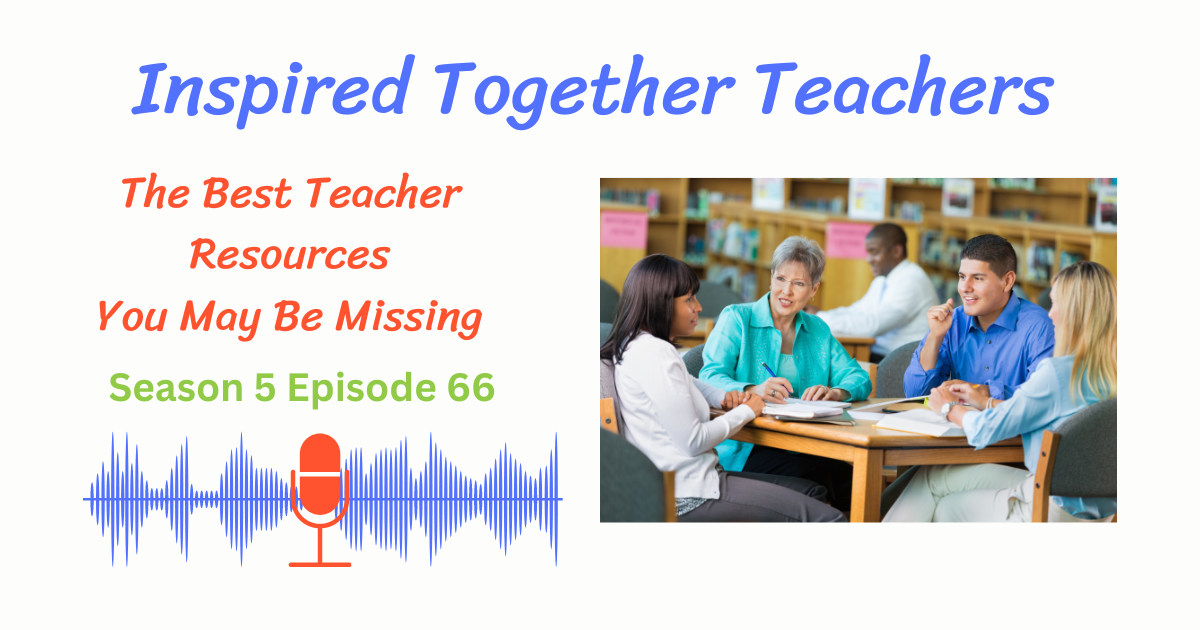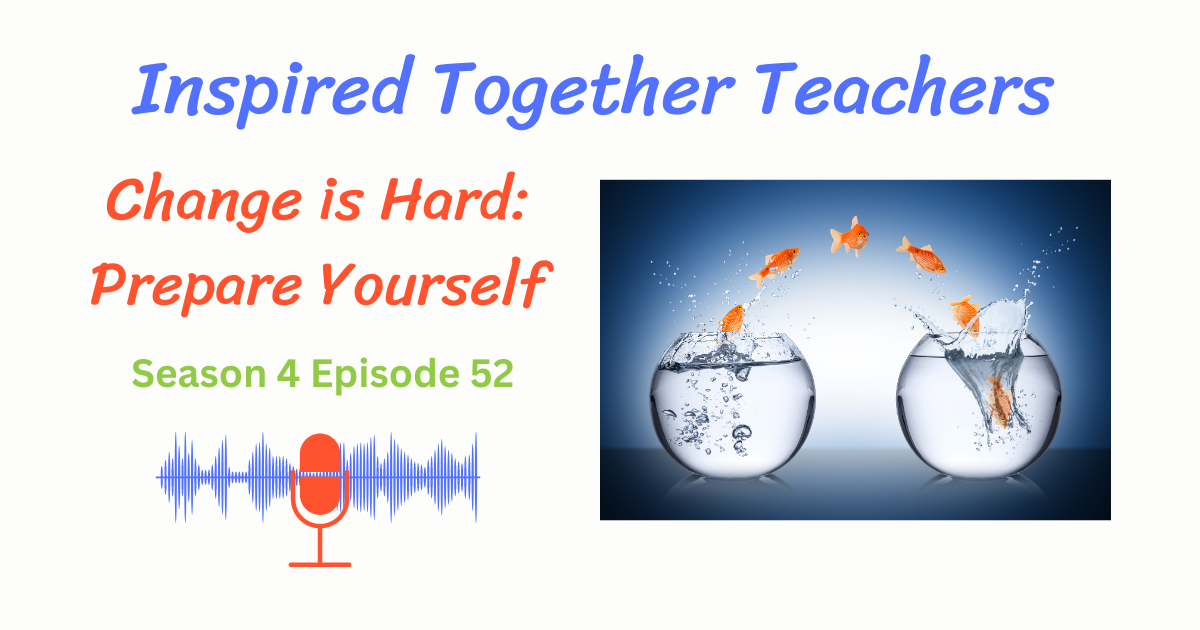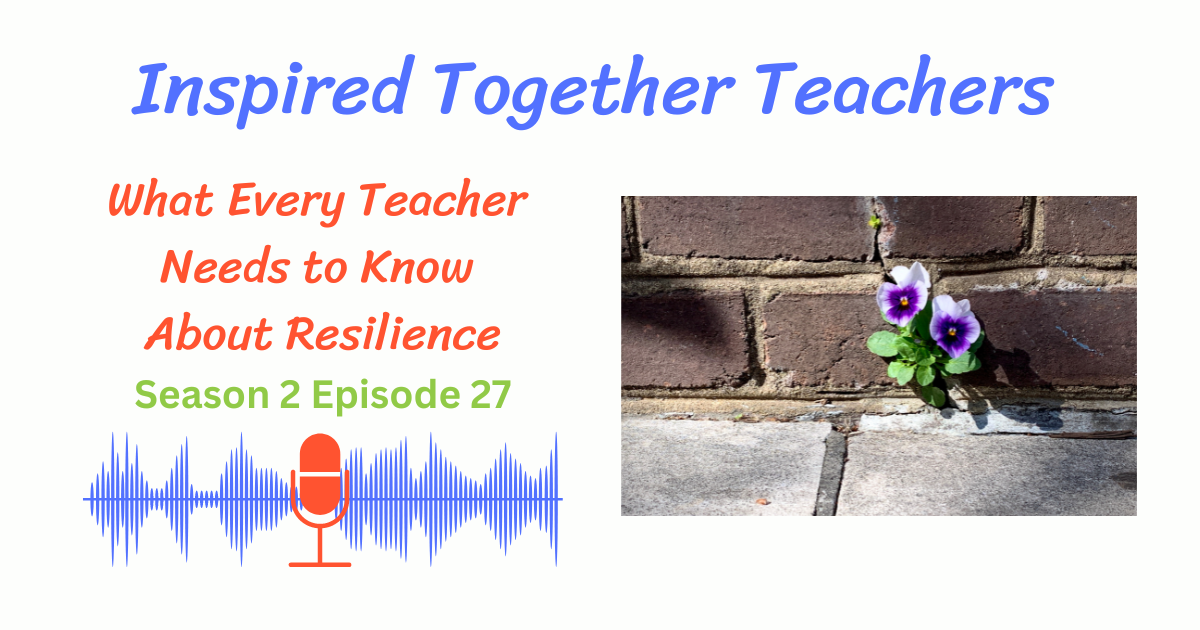The Best Teacher Resources You May Be Missing! S. 5 E. 66
Check out this episode to find the best teaching resources you might be missing!
Show Notes:
Episode Summary:
We are always looking for ways to make our jobs easier and better. We want students to learn in the best way and we want to keep our sanity and protect our time in the process. As teachers, we are always on the hunt for resources. We look to websites, books, social media and other resources to help us. We buy templates and scour social media for ideas.
But what if we told you the best resource of all is already in your school building every day?
Stick around as we explore the best teacher resources you may be missing!
In this episode:
As always, this is a summary of the discussion. On the podcast we also share examples and stories. For the best experience, please listen to the episode.
Introduction:
We all need resources to do our jobs better and in a more timely fashion. Just look at Teachers Pay Teachers. We recently read that in the last year alone, two in three U.S. teachers downloaded a teaching resource from TPT. There are over 7 million resources there. That alone tells us how often teachers are looking for resources.
Today, we will explore some of the most common ways that teachers obtain resources. We will ultimately convince you that the very best teacher resources you have are those that are at your disposal daily…other teachers that you know and work with regularly.
Pros and common problems with teacher resources:
Teacher Resources: Books
Books are a common resource for teachers. We love books. They are often based on research. They are vetted. Someone put lots of thought into them. They are a great source for ideas. You can understand the big picture of what you are teaching and also, the how and why.
Books can be expensive, and those costs can add up quickly. It also takes time to find and read books.
Another downside with books is that they can become outdated quickly. New information is found or added. New versions of books can be costly, if you are even aware that there is a new version.
Teacher Resources: Websites
Websites are easy to access. Website information is often free or the materials are available at a low cost. In this category we include Teachers Pay Teachers, websites created by teachers and websites that are run by national organizations. For example, did you know NASA runs a website for kids called SpacePlace that is stocked with videos, images, craft ideas and activities that teachers could easily incorporate into their classrooms for free?
The Smithsonian and other major museums also have excellent sites for teachers.
A major issue with websites is that they are not always vetted. Someone can be creating materials that are actually wrong and no one is fact checking. You need to really know the source and make sure it is reliable and valid. This can take a lot of time as you can go down lots of rabbit holes in looking for a resource that you want.
Also, there is no guarantee that the materials are aligned with your curriculum standards. One teacher in Wisconsin was fired for using a TPT resource which was determined to be misaligned with curriculum standards.
There are good things available on websites, but be careful.
Teacher Resources: Social Media
There are many different social media sites by and for teachers, and many teachers around the world are posting information on these sites. There are certainly potentially good resources available through social media.
Again, using social media can be a time suck. Scrolling can be fun and engaging. Also, you don’t know if the ideas and information really work or if the teacher just says it does to get more likes and follows. Teachers can make a lot of money off of social media. They rarely share their fails so you have to wonder if everything they are sharing is actually a resource that they use and is effective or if it was just shared for the views or for potential affiliate sales.
Basically, proceed with caution on these resources. Teachers can share wonderful things, but you do need to be careful.
Teacher Resources: The Teachers You Know and Work With
We have said it before and we will definitely say it again, but teaching is a very isolated profession. We are often doing things in our classroom that the teacher across the hall is doing as well, but we just haven’t had time to compare notes, ideas, resources, and strategies.
Have you ever considered that the teacher next door might be your best resource?
Your colleagues will be honest.
Of course this also involves you being honest and a little bit vulnerable, going to them and expressing when you need help. When something is effective, they will tell you. If something doesn’t work they will probably share that with you as well.
One caution, just because it didn’t work for one person, doesn’t mean it might not work for you. You can learn from their mistakes, but you have different students and a different teaching style and things may work differently for you.
Your next door teachers are easily accessible and responsive.
You can walk across or down the hall to talk to them or pick up the phone and call them easily. This isn’t an option with website authors, books, or the people you are watching on social media. After using those other resources, you may be left with questions that are unanswered. When teachers are easily accessible to you, it can become a two sided conversation rather than a one way sharing of information.
The teachers around you want to see you succeed.
Most teachers want to see their colleagues succeed. If you haven’t found a teacher in your building or your life yet who wants to see you succeed, keep searching. Schools are stronger and happier when teachers work together.
You can easily swap materials with colleagues.
You don’t need to go and buy all the things if you can share with the teacher across the hall. Swap out bulletin board materials with your bestie who teaches at a different school in the district. Have a make and take lunch break with another teacher on your team and then you can swap the resources you’re making when you both need them. Making resources with another teacher is a whole lot more fun than doing it on your own.
You can brainstorm the best way to create and use materials and ideas with your teacher friends.
There is nothing better than a great brainstorming session where you get excited by building off each others’ ideas. Capitalize on that brainstorming energy and excitement.
Conclusion:
Schools are better when the teachers are better. Teachers working alone and having their own materials and ideas are missing out on the greatest resource which is each other. Working alone doesn’t make schools better. Most teachers are natural helpers and learners. Be each other’s best resources- you deserve that!
We end with this quote from author and educator Robert John Meehan, “The most valuable resource that all teachers have is each other. Without collaboration our growth is limited to our own perspectives.”
Recap:
We are always looking for resources to be better teachers and to save us time. We look to websites, books, social media and other resources to help us. But ultimately, we have the best resources right at our fingertips. That teacher next door, the teacher down the hall or your bestie who is a teacher – these people are actually the best resource of all! When we maximize our teacher resources, we also maximize our time, energy and happiness.
Quote:
Robert John Meehan “The most valuable resource that all teachers have is each other. Without collaboration our growth is limited to our own perspectives.”
Robert John Meehan
Connect with the Inspired Together Teachers Community:
Website: https:www.inspiredtogetherteachers.com
Instagram: Inspired-Together-Teachers
Facebook: Inspired Together Teachers
Facebook Teacher Warriors Group: Teacher Warriors Facebook Group
Linked In: Inspired Together Teachers
More About Inspired Together Teachers:
Are you a teacher struggling to balance your best work with your best life?
If you are dedicated and caring but often overwhelmed and exhausted, join us at Inspired Together Teachers. We’ll give you inspiration, strategies and tips that help you navigate life’s challenges as a stronger, more confident, and more joy filled person, both in and out of the classroom.
Inspired Together Teachers will give you practical tools to experience more of what matters most in your life.
Co-hosts Paula Schmidt and Michele Vosberg are award winning educators with the experience and skills to help teachers thrive in life and work. They’ve taught at all levels, worked with thousands of teachers, and conducted workshops around the world. They are also the authors of the #1 best-selling book The Inspired Teachers Journal: A Weekly Guide to Becoming Your Best Self.
Paula and Michele would love to have you to join them on their quest to lived inspired lives.






